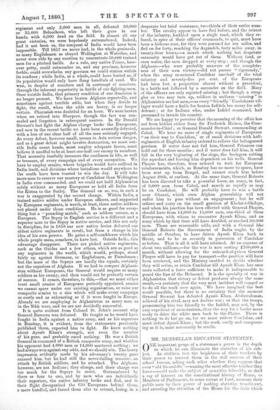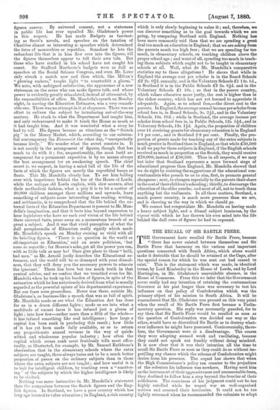MR. MUNDELLA'S EDUCATION STATEMENT.
ONE important gauge of a statesman's power is the depth to which he can illuminate the statistics of his sub-
ject. As children test the brightness of their teachers by their power to interest them in the dull corners of their school lessons, asking each other whether they suppose that even " old So-and-So "—naming the most effective teacher they know—could make the subject of annuities tolerable, or shed a ray of interest on the constitutional history of Rome, so Members of Parliament, to some extent at least, measure their public men by their power of making statistics translucent, and arresting the attention of the House for the facts which figures convey. By universal consent, not a statesman in public life has ever equalled Mr. Gladstone's power
in this respect. He has made Budgets as fascinat- ing as Scott's novels, and speeches on the taxation of Charities almost as interesting as speeches which determined the fates of monarchies or republics. Somehow he lets the redundant life that is in him flow over into the figures, till the figures themselves appear to tell their own tale. But those who have studied in his school have not caught his secret. Sir Stafford Northcote's budgets were as dull as speeches at the Social Science Congress, and even Mr. Lowe only struck a match now and then which, like Milton's " glowing embers," taught light " to counterfeit a gloom." We note, with unfeigned satisfaction, the appearance of a new statesman on the scene who can make figures talk, and whose power is evidently greatly stimulated, instead of attenuated, by the responsibilities of office. Mr. Mundella's speech on Monday night, in moving the Education Estimates, was a very remark- able one. There was no attempt in it at eloquence. There was no effort to enliven the subject by introducing out-of-the-way matters. He stuck to what the Department had taught him, and only endeavoured to make it teach the House as much as it had taught him. And it was wonderful what a story he had to tell. His figures became as vivacious as the " Scotch pig " in the Money Market, which, according to our substan- tial contemporary the Economist the other day, " unexpectedly became lively." We wonder what the secret consists in. It is not merely in the arrangement of figures, though that has much to do with it ; for, unquestionably, the most lucid ar- rangement for a permanent exposition is by no means always the best arrangement for an awakening speech. The chief secret is, we suspect, in having a mind full of the life of the facts of which the figures are merely the superficial buoys or floats. This Mr. Mundella clearly has. To see him boiling over with impatience behind the bar of the House of Lords, while the antique old Lords explain, with slow accents, after their methodical fashion, what a pity it is to let a matter of 40,000 children amongst three millions and upwards, learn something of subjects more interesting than reading, writing, and arithmetic, is to comprehend that the life behind the ex- ternal facts of the Education Department is present to Mr. Mun- della's imagination, and that it frets him beyond expression to hear legislators who have no such real vision of the life behind these external facts, prose away on a momentous branch of so great a subject. And it was that vivid perception of what the dull paraphernalia of Education really signify which made Mr. Mundella's speech on Monday evening so vivid with all its bristling figures. ' There is no question in the world so all-important as Education,' said an acute politician, but none so soporific ; for Heaven's sake, get all the power you can, with as little talk as may be! Once give place to those " bold, bad men," as Mr. Arnold justly describes the Educational re- formers, and the world will be so dismayed with your dismal- ness, that they will deny you the necessary powers to educate the ignorant.' There has been but too much truth in that cynical advice, and we confess that we trembled even for Mr. Mundella when he took up his burden of figures, in spite of the animation which he has notoriously derived from what is usually regarded as the powerful opiate of his departmental experience. But our fears were groundless. Never was there, outside Mr. Gladstone's, so business-like a speech that was so full of spirit. Mr. Mundella made us see what the Education Act has done for us in a dozen different lights ; made us see into what a multitude of vacant faces it has infused just a gleam of light ; into how few—rather more than a fifth of the whole— it has infused something like real intelligence ; how large a capital has been sunk in producing this result ; how little of it has yet been made fully available, so as to return any proportionate annual revenue in the way of quick- witted and wholesome popular industry ; how often the capital which seems sunk most fruitlessly tells most effec- tually, as illustrated, for example, by Mr. Samuel Rathbone's observation that in the elementary schools where the extra subjects are taught, there always turns out to be a much better proportion of passes on the ordinary subjects than in those where the extra subjects are not taught ; and how useful it is to bait for intelligent children, by teaching even a " smatter- ing " of the subjects by which the higher intelligence is likely to be elicited.
Nothing was more instructive in Mr. Mundella's statement than the comparison between the Scotch figures and the Eng- lish figures. . In Scotland, we have a poor country which has long ago learned to value education ; in England, a rich country
which is only slowly beginning to value it ; and, therefimes we can discover something as to the goal towards which we are going, by comparing Scotland with England. Nothing has been more commonly said than that we are spending a great deal too much on education in England; that we are asking from the parents much too high fees ; that we are spending far too. much, in elementary schools, on teaching children above the proper school age ; and worst of all, spending too much in teach- ing them subjects which ought not to be taught in elementary schools at all. Well, what do Mr. Mundella's comparative statistics say to these allegations V He shows that while in England the average cost per scholar is in the Board Schools £2 2s. 0/d. annually, and in the Voluntary Schools £1 14s. ld., in Scotland it is in the Public Schools £2 3s. 6id. and in the Voluntary Schools £1 18s. ; so that in the poorer country, which values education more justly, the cost is higher than in the richer country, which has not yet learned to appreciate it adequately. Again, as to school fees,—the direct cost to the parents. In England, the average annual income per scholar from school fees is, in Board Schools, 9s. 31d., and in the Voluntary Schools, 10s. 10d. ; while in Scotland, the average income per scholar from school fees is, in Public Schools, 12s. 5id., and in Voluntary Schools, 12s. 11-d. Again, the proportion of children over 14 receiving grants for elementary education is in England 1.1 per cent., and in Scotland 2.8 per cent. Finally, the pro- portion of grants made for teaching any of the extra subjects is much greater in Scotland than in England,so that while £50,500 is all we pay for these subjects in England, if the English schools received as much in proportion as the Scotch, they would receive £70,000, instead of £50,500. Thus in all respects, if we may but infer that Scotland represents a more forward stage of educational progress than England, Mr. Mundella showed that we do right by resisting the suggestions of the educational con- ventionalists who preach to us to aim, first, to promote general cheapness ; next, to cheapen especially to the parents their share in the cost of their children's schooling; thirdly, to discourage the education of the older youths; and most of all, not to teach them anything but the rudiments. In all these matters, Scotland, a much poorer country, is much more generous than we are, and is showing us the way in which we should go.
We cannot but congratulate Mr. Mundella on having made a heavy subject light, and a dismal subject luminous, by the vigour with which he has thrown his own mind into the life behind the dull rows of figures he had to expound.



































 Previous page
Previous page